Unlocking zkSync Era Pioneering a New Era of Layer 2 Scaling
Unlocking zkSync Era - Pioneering Layer 2 ScalingAuthor: [email protected]; Data Source: zkSync Dashboard
Layer 2 solutions have received much attention in addressing Ethereum scalability issues. These solutions aim to overcome the limitations of Layer 1 by introducing technologies such as Rollups, State Channels, or Nested Blockchains. There has been a lot of debate around the pros and cons of Optimistic Rollups and Zero-knowledge Rollups (ZK-rollups) in the field of Layer 2 scalability.
At the ETH Seoul conference in 2022, Vitalik Buterin, co-founder of Ethereum, expressed his confidence in ZK-rollups winning in the Layer 2 scalability competition. By 2023, the zkSync Era has become one of the important focuses in the field of ZK-rollups.
About zkSync Era
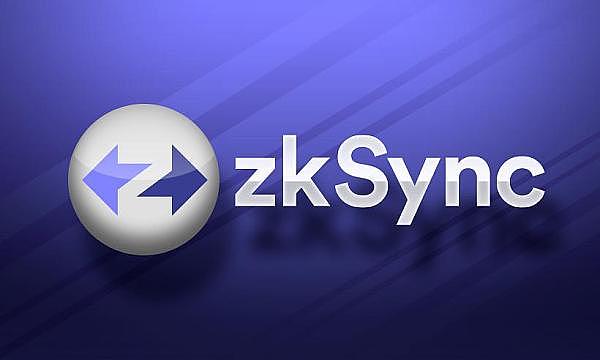
- First Criminal Case Involving Hong Kong’s Cryptocurrency Circle What Crime Did JPEX Criminals Commit?
- Thailand plans to tax the overseas income of cryptocurrency traders.
- Block space is a scarce commodity. How can it be objectively evaluated?
zkSync Era is an advanced Layer 2 protocol that utilizes cutting-edge zero-knowledge cryptography to enhance the security and value of Ethereum. Building upon the success of zkSync 1.0 (now zkSync Lite), zkSync introduced zkSync Era as its zkSync 2.0 version.
It is worth noting that zkSync Era is the world’s first zkEVM blockchain, allowing applications written in “native” EVM to seamlessly run on this ZK-based Layer 2 network. This groundbreaking feature, known as “EVM equivalence,” ensures compatibility with existing Ethereum infrastructure while fully leveraging the advantages of zero-knowledge technology.
Matter Labs is the team behind zkSync Era. Founded by experienced software architects, Matter Labs has received support from venture capital firms and some major companies in the Web3 space, including a16z, Blockchain Capital, and Union Square Ventures.
In this article, the term “zkSync” refers to “zkSync Era”.
Why is it so popular?
On March 24, 2023, zkSync launched its mainnet and opened to all users, becoming the first among many zkEVMs to go live on the mainnet. According to data from its official Twitter page, zkSync recorded over one million transactions in just the first four days of launch. Within just 10 days after the mainnet launch, zkSync’s Total Value Locked (TVL) exceeded $100 million. Since then, TVL has seen significant growth, reaching a peak of $736 million on July 5.
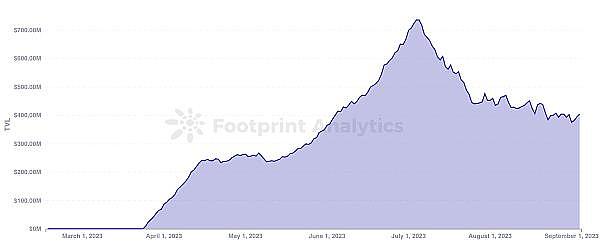
Source: zkSync Era Chain TVL
Furthermore, in terms of user activity, zkSync has established its dominance among Rollups. In the past month (as of September 4, 2023), zkSync’s total number of transactions reached an impressive 28.58 million. This number is more than double the transaction volume of the second-ranked Rollup solution, Starknet.
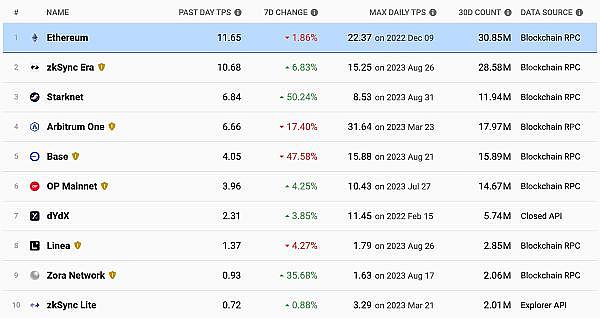
Source: Activity-L2Beat
Why is zkSync so popular?
-
Enforcing honesty through mathematics and code
In zkSync, they are committed to applying advanced cryptography, especially zero-knowledge proofs, with the ultimate goal of eliminating all trust assumptions in the public blockchain space. Their vision is to establish a foundation of trust that relies solely on verifiable elements (mathematics and code). This focus on trustless solutions is one of the reasons why ZK-rollup has made significant progress in recent years.
-
Security
zkSync prioritizes security through multidimensional approaches. During the one-year testnet phase, zkSync underwent extensive testing and auditing without major issues. It relies on mathematical and cryptographic principles to ensure 100% security and publishes proofs to Ethereum Layer 1 for transaction verification. Compatibility with EVM reduces potential errors, layered design separates critical components, and monitoring tools, information disclosure, bug bounties, and security audits further enhance zkSync’s security measures.
-
High Throughput and Low Cost
zkSync provides a seamless, low-cost solution for efficient token transfers and payments. It offers instant confirmation and finality for ETH and ERC20 token transfers on Layer 1, ensuring fast and secure transactions. Additionally, zkSync has extremely low transaction fees, significantly reducing costs compared to the mainnet. Users can easily make payments to existing Ethereum addresses (including smart contracts) and the fees can be paid in the token being transferred, enhancing flexibility. zkSync allows funds to be quickly withdrawn to the mainnet, enabling users to access their funds swiftly.
According to data from Footprint Analytics, zkSync has seen significant growth in daily active users (DAU). On May 10, 2023, approximately 47 days after its launch, zkSync’s DAU reached 153,500, marking the platform’s first time surpassing 100,000 DAU. After several months of operation, zkSync reached its highest DAU record on August 26, 2023, at 363,800. This upward trend indicates a substantial increase in user adoption and interest.

Source: Daily Active Users – zkSync Era Chain Overview
Since its launch on March 24th, zkSync’s daily transaction volume has maintained a steady growth trend. In the first month, the daily transaction volume was around 300,000 transactions, and it steadily increased to approximately 900,000 transactions per day by August. Meanwhile, zkSync’s average transaction fee has also decreased. The initial average transaction fee was 0.00025 ETH and has now dropped to 0.00012 ETH. These trends indicate a growing demand for zkSync services, and the decrease in transaction fees over time has improved cost-effectiveness for users, making transaction fees more affordable.

Source: Daily Transactions & Avg. Transaction Fee – zkSync Era Chain Overview
Over time, the TPS (transactions per second) of zkSync has significantly improved. The initial TPS from March to May was below 4 and then steadily increased, reaching a range of 9 to 11 by August. In comparison, Ethereum’s TPS during this period remained relatively stable in the range of 12 to 14. These advancements indicate that zkSync is expected to surpass Ethereum’s TPS in the near future and become a promising scalability solution in the blockchain ecosystem.
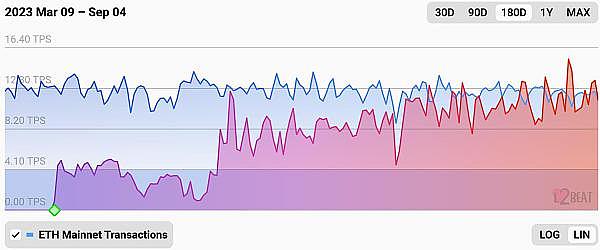
Source: TPS – L2Beat
-
Open Source and Forkable
zkSync adopts permissive software licenses such as MIT/ALianGuaiche 2.0 and is committed to maintaining its fully open-source code. This approach allows anyone to access, inspect, modify, and create branches of the code. The zkSync team believes that the ability to fork is crucial for preserving the freedom and trustworthiness of the blockchain, preventing power concentration in the hands of centralized entities. By keeping the code open-source and allowing the protocol to exit in any circumstance, zkSync ensures that the community can take on the responsibility of governing zkSync and guide it in the right direction if the core team or protocol governance deviates from its mission. If you are interested in forking, you can find relevant links on Matter Labs’ GitHub and zkSync Era’s documentation.
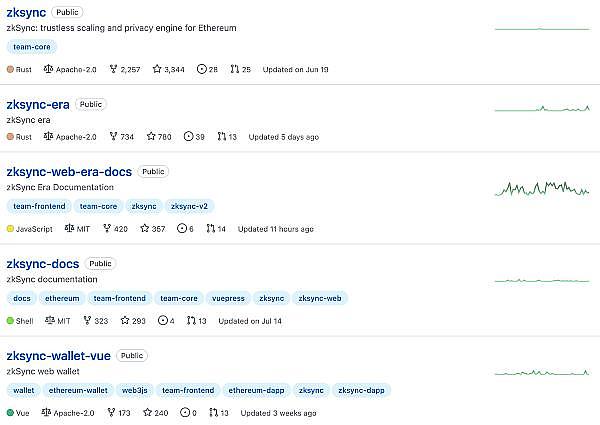
Source: Top 5 “zkSync” Repositories Sorted by Stars – Matter Labs GitHub
-
Community Ownership
While initially operating a centralized sequencer and protocol upgrades for security, the zkSync team has recognized the importance of community ownership. Although they initially operate a centralized sequencer, it does not affect the security of ZK-rollup or control user funds. The team plans to relinquish upgrade control after the Alpha/Beta stages to achieve full decentralization of critical network components. If the team deviates from this path, they encourage the community to raise concerns and reserve the possibility of forking the project. As of August 31, 2023, zkSync has 1.2 million followers on Twitter and 69,600 members on Discord.
Ecosystem
Through its innovative utilization of ZK-rollups, zkSync provides an attractive opportunity for Ethereum projects aiming to improve scalability and efficiency. Since its launch in March 2023, the zkSync ecosystem has experienced significant growth. As of August 31, 2023, there are a total of 87 projects live on the platform, including:
-
28 DeFi projects: SyncSwap, Mute.io, and Maverick Protocol, among others, DEX projects, ReactorFusion, Eralend, and other lending projects.
-
23 NFT projects: zkAnimals, NFTme, Kreatorland, and others.
-
11 wallets: Argent, Metamask, OKX Wallet, and others.
-
10 cross-chain bridges: Orbiter Finance, Meson, Celer Network, and others.
-
7 GameFi projects.
Despite the growth of the zkSync ecosystem, there are still areas that need attention. On one hand, various areas within the zkSync ecosystem have encountered difficulties in attracting support from top projects, which is crucial for building trust and accumulating TVL based on brand reputation. Without mature projects supporting the zkSync ecosystem, it will be difficult to gain widespread trust and participation.
On the other hand, the zkSync ecosystem includes some projects that are still in the early stages and may lack comprehensive information disclosure or clear professional development focuses. Some projects within the ecosystem seem to be more focused on short-term speculation rather than building a solid foundation. Low-quality projects with limited annual percentage yield (APY) may face challenges in retaining user funds during bear markets, which may impact the overall growth of the ecosystem.
Why is the hype decreasing?
Since reaching its TVL peak in July, the hype around zkSync has significantly declined. In addition to the aforementioned factors of insufficient ecosystem development and low average quality of existing native projects, we can find more key factors that contribute to this trend:
Airdrop-driven participation: Many participants join zkSync solely for the expectation of airdrops, rather than actively participating in the long-term development of the ecosystem. This lack of motivation to hold funds for the long term hinders the ecosystem’s ability to foster sustainable growth and participation.
Security incidents: Security incidents that occur within the nascent zkSync ecosystem further weaken investor interest. On July 25th, EraLend, the largest lending platform on zkSync, suffered a read-only reentrancy attack worth $3.4 million. This attack resulted in a 70% decrease in EraLend’s TVL.
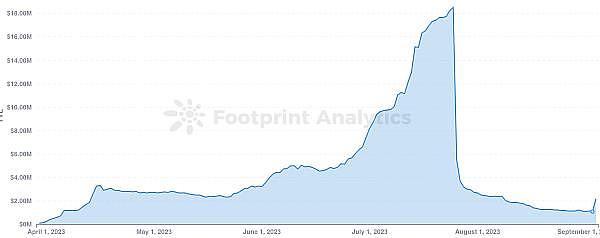
Source: EraLand TVL
Hyperchains
In June of this year, zkSync launched a new network called “Hyperchains,” which is planned to go live on the testnet by the end of 2023. Hyperchains are fractal-like instances of zkEVM that can run in parallel and settle on Layer 1. This innovative concept is seen as a potential response to Optimism’s Superchain concept. By leveraging Hyperchains, zkSync aims to establish a secure and scalable ecosystem to achieve wider availability on Ethereum.
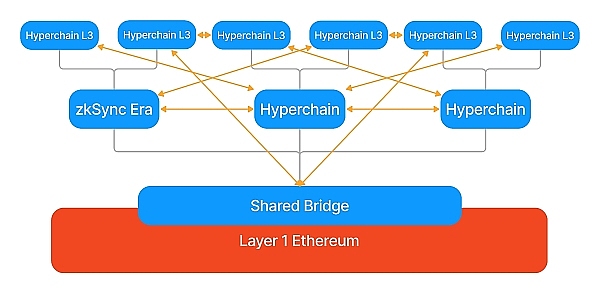
Source: zkSync Era Docs
Conclusion
In summary, zkSync Era has established itself as a leading scalability solution in the Ethereum ecosystem. Regarding the launch of its native token, Matter Labs CEO Alex Gluchowski stated in March 2023, “There are currently no plans to launch a token. Tokens only make sense when the network achieves true decentralization, which is in the distant future.” The road ahead is filled with exciting possibilities, and the community eagerly awaits zkSync Era’s next steps in further development and realizing its vision.
We will continue to update Blocking; if you have any questions or suggestions, please contact us!
Was this article helpful?
93 out of 132 found this helpful
Related articles
- Head of SEC’s Division of Encrypted Assets and Network More Charges to be Filed Against Exchanges and DeFi
- LD Capital Storj Short-Term Liquidity Analysis
- ARK Invest acquires European ETF issuer Rize ETF Limited.
- When we say institutions are entering cryptocurrencies, what institutions are we actually referring to?
- Starknet’s Volition Analysis The Perfect Interpretation of Data Security and Cost Control
- IOSG founder Token2049 impression Bull market still needs time, the toughest time has come
- Behind the 15 Celebrities Involved in the JPEX Case KOL Cold-blooded Hype Murder, Downtown Cash Throw for Traffic





